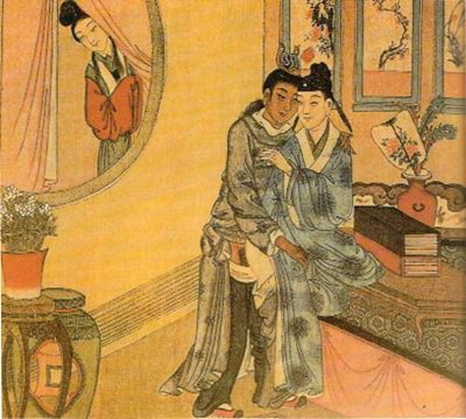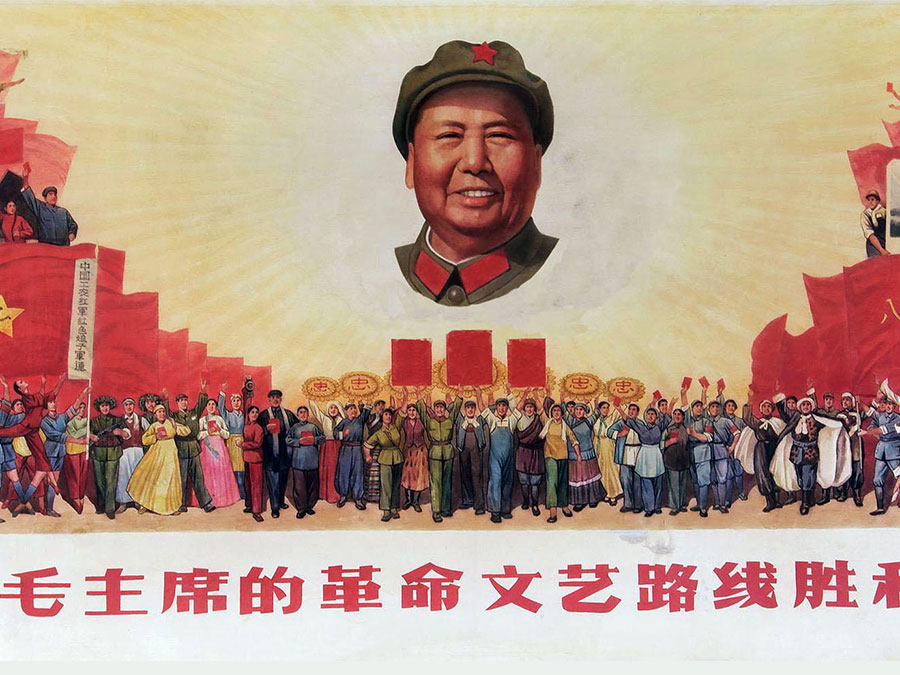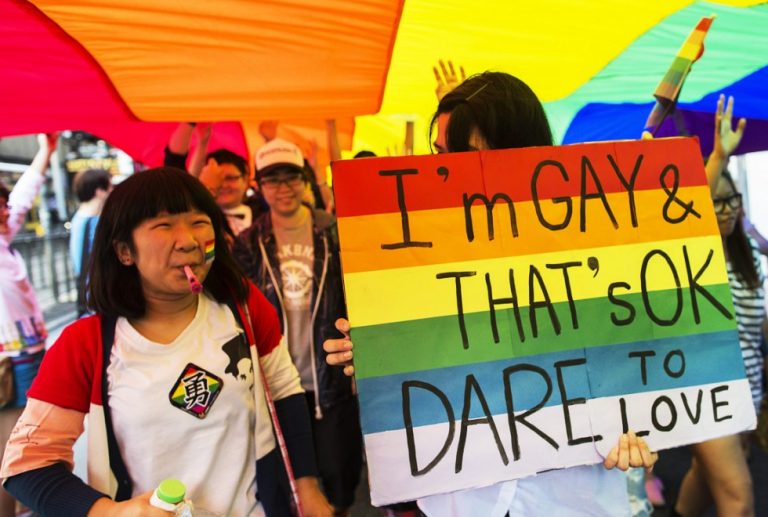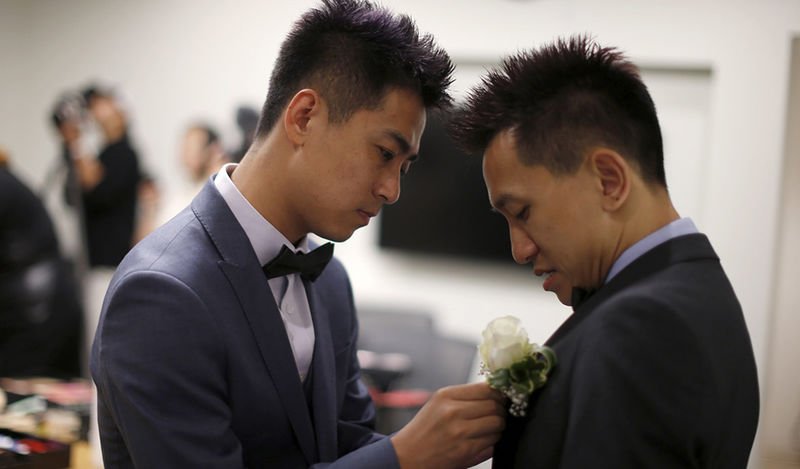Originally published on Domino Chinese Blog, July 2020
China is home to the world’s largest lesbian, gay and bisexual population, there is a long and well documented history of homosexuality in China and homosexuality is legal in China.
However, despite these facts which suggest a positive attitude towards homosexuality, the situation for many LGBT people in China is still complex, with many individuals facing discrimination and struggling for acceptance. Historians suggest that homosexuality was more widely accepted in ancient China than it is today, and much of the opposition to homosexuality comes from the social and cultural upheavals of the past century.

Homosexuality in Ancient China
Historical texts by Siam Qian, Memoirs of the Historian, and the Records of the Han by Ban Gu, indicate that homosexual relationships where not uncommon in ancient China, particularly among the ruling classes. The renowned 20th Century historian Pan Guangdan even suggests that many emperors in the Han dynasty were bisexual.
According to a study by Bret Hinsch, Professor of History at Fo Guang University, opposition to homosexuality was not firmly established until the 20th century. Researchers who have studied China’s historical legal documentation have come to similarly conclusions, with very few laws ever forbidding homosexual behaviour. Furthermore, any legislation focused purely on male homosexuality, with lesbianism never unlawful.

The Legal Status of Homosexuality in China
Legislation in China which condones homosexual behaviour focuses entirely on the act of anal sex between men, refered to in Chinese as ‘jijian’ (鸡奸), and translated as ‘sodomy’ or ‘buggery’.
According to Matthew Sommer, the first legal reference to ‘jijian’ can be found during the Ming-dynasty at which time the act was punished by, “whoever inserts his penis into another man’s anus for lascivious play shall receive 100 blows of the heavy bamboo.”
In Qing legal documentation from 1734, ‘jijian’ was included with preexisting classifications of illicit sex between men and women, and sexual assualt, and was punished accordingly. As such the act of ‘jijian’ was considered an illegal act between either homosexual or hetrosexual couples, rather than as a law targeting homosexual behaviour.
During the final years of the Qing-dynasty government (1910-11) large sections of the country’s legal code were rewritten and at that time the statute on ‘jijian’ was removed. Under the Republican government (1912–1949) there was no renewed effort to criminalize sex between men.
During the turbulent years of the Chinese Communist Revolution, the previous legal system (Kuomintang) was abolished, and the communist party set about establishing new laws and regulations to support their socialist rule.

From 1949, the majority of new laws focused on land reform, corruption and dealing with counter revolutionaries. No laws forbidding homosexuality were passed during Chairman Mao’s time as leader of China. However, that should not be interpreted that homosexuality was accepted. As J.Wu documents, 1949 to the late 1970s were ‘the dark ages’ for homosexual men in China, ‘And there is no doubt that, although sex was not taboo, during the post-liberation years of the 1950s and early 1960s a correct code of sexual and gender norms was emphasised in the state discourse on sexuality. Within that discourse, the representation of homosexuality was largely absent in an effective erasure and exclusion of homosexual Chinese men from the picture of a healthy state.’
Furthermore, during the Cultural Revolution homosexual males often lost their jobs, were detained without trial, sent to labor reform camps and some faced execution.

Ambiguity
The widespread persecution and discrimination of homosexuals during the 1950s and 1960s lead many, even court officials, to believe that homosexuality was illegal, as the following correspondences highlight.
In a letter dated March 19, 1957, The Heilongjiang Provincial High People’s Court, asked the National Supreme People’s Court for instructions in a case of consensual anal sex between two men
‘Serial Number 139: In Huling County, two labor reform convicts, Li and Li, had consensual sexual intercourse [jijian]. The Middle Level People’s Court in province asked whether their behavior constitutes a crime that should be held accountable as a criminal offense’
The reply from the The National Supreme People’s Court, date April 29, 1957, explains;
‘Regarding the question whether sodomy between two consenting adults con- stitutes a crime, a legislative solution is needed in the future. Before a clear provision is made in the law, we think it appropriate not to treat the case in your court mentioned as a criminal offence.’
Homosexuality and Hooliganism
In the 1980s homosexual sex was labelled a ‘hooligan behaviour’ and was made unlawful.
In the 1984 documentation ‘The Answer to the Questions on How to Deal with Current Hooligan Cases’ by the National Supreme People’s Court and the National Supreme People’s Procurator, jijian was listed under “other hooligan activities” along with “sodomizing young children, sodomizing adolescents by force, or severe cases of using violence and coercion to commit sodomy repeatedly.”
In this document, forced sex between men is clearly criminalized, although sex between consenting male adults remains ambigious. In reality, local officials were often free to interpret the guidelines as they chose.

Lesbianism in China
There are far fewer historical records of lesbianism than male homosexuality, in Chinese historical records (and in records in other countries) due to most historical writings and records focusing on men.
The term same-sex love, ‘tong xing ai’ (同性爱), never appeared in any official Chinese legal document, and moreover, sex between women has not been a legal issue in the PRC. Although, that’s not to say lesbians in China did not face discrimination and persecution.
In Anhui Province, 1991, a father accused his daughter and her girlfriend of “committing homosexuality” and asked the local police to “strictly punish the ugly phenomenon” between “the two hooligans.”
Local police were unsure of how to proceed so they contacted the National Ministry of Public Security. Their answer clarifies that lesbian activity was not an legal offence.
‘Currently, the law of our country does not have a clear stipulation on what homosexuality is and its legal status. In light of this situation, in principle, the case you reported should not be accepted. It is also inappropriate to treat the case as a kind of hooligan behaviour and penalise [the people involved] for disrupting the social order.’

20th Century: Restoring the Esteem of Chinese Homosexuals
In 1997, a new Criminal Law of the PRC was promulgated and the provision on hooliganism was deleted. Homosexual sex was official decriminalized. Furthermore, in 2001 homosexuality was removed from the list of mental illnesses.
The reforms of the last two decades suggest Chinese society has become more open and accepting sexual orientation. In large cities a visible LGBT can be seen with gay bars, gay saunas, gay gyms and gay nighclubs in the country’s more cosmopolitan urban centers. Beijing and Shanghai now have gay pride month.
On the internet, LGBT websites and forums offer a platform for China’s lucrative ‘Pink Economy’ and in recent years a number of high profile companies, including Alibaba and Nike have shown their support for the LGBT community.
More importantly one of the largest Chinese newspapers, People’s Daily, published a leading commentary supporting LGBT individuals, emphasizing that there is more than one sexual orientation in the world.
However, the biggest obstacle most homosexuals in China face is pressure from family members. Chinese culture is still revers Confucius values and continuing one’s family line; not doing so is a failure as Fan Popo, a filmmaker and activist from Shandong explains, “For some parents, it’s the end of the world when their children are queer”.

Many LGBT activitist believe that allowing same sex marriage would advance attitudes towards homosexuality, undo years of discrimination and encourage more families to accept their LGBT children.
Recently, China took an important step towards allow same-sex marriage, through a legal framework known as ‘Guardianship Appointment’ (yi ding jian hu). This legal mechanism gives individuals the freedom to appoint their own guardian through a legal agreement.
Recently, china’s highest law-making institution, publicly acknowledged petitions to legalize same-sex marriage, triggering a nationwide discussion of a topic that was once taboo. Expectations are growing that eventually China will join the growing number of countries that have passed legislation to protecting the rights of LGBT community and allow same sex marriage. When that happens China will finally be on the way to restoring the esteem of Chinese homosexuals.
While same-sex marriage remains illegal on the Chinese mainland, a growing number of LGBT couples are opting for a relatively new form of recognition: legal guardianship.https://t.co/5bSLZRHNXf— Sixth Tone (@SixthTone) October 24, 2019
